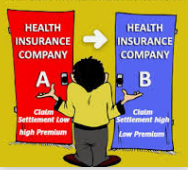Pros and Cons of Group Health insurance
The insurance marketplace is certainly challenging, but count your lucky stars that a minimum of you've got choices. thereto end, this text goes to explore the pros and cons of group insurance.
Group insurance Pros
- Group health premiums are subsidized by the employer. Generally, an employer must contribute a minimum of 50% of the "employee only" premium. As such, if you're the worker, you'll likely get a richer health plan for the fewer premiums than you'd pay within the individual health marketplace. However, the value to feature your dependents to the employer's plan could also be cost-prohibitive. during this case, and assuming that your dependents can qualify, then you'll want to place them on a private health plan.
- Group health premiums for giant families are equivalent to those for little families; whereas within the individual market, you pay a separate premium for each loved one. So, if you've got an outsized family, you'll be ready to get a far better deal by adding them to your employer's plan. like any insurance change though, don't make any changes without consulting with an experienced insurance advisor in your state.
- Group insurance in most states is a guaranteed issue - meaning that you simply cannot be turned down due to pre-existing health conditions. this is often a true blessing if you or a loved one features a medical condition that forestalls you from qualifying for an individual plan. But, this is often a double-edged sword. While being a guaranteed issue may be a huge benefit for those with pre-existing medical conditions, it does come at a price. This one feature alone accounts for many of the disparities between the group and individual insurance premiums. Yes, that's right - in most states, individual health premiums are nearly always less costly than group health premiums.
- Most group plans cover maternity. So, if you're planning on having more children, you ought to definitely consider hopping on to a gaggle plan. While you'll add a "maternity rider" to individual plans, these riders tend to be expensive, restrictive, and otherwise provide less value than the coverage you'll get during a group health plan. That being said, if you're considering having more children, we recommend that you simply contact an insurance advisor in your state for advice about what's best for your family. the proper answer is different for every unique family.
- Economies of scale can benefit employees of huge employers. it's true that the larger the group, the larger the danger pool is during which to share the danger which may end in lower premiums than are available within the individual health market. However, the guaranteed issue "issue" CAN wreak havoc on this sort of plan. for instance, an outsized employer with good benefits tends to retain employees for long periods of your time. Eventually, the typical age of the group starts to sneak up then do premiums. additionally, people with large medical needs (expensive medical conditions) tend to be interested in large plans because they're guaranteed issue with good coverage. And so, over time, not only is that the group's average age increasing, but the group is additionally attracting employees with large expected health costs. this is often the dilemma that we see with large health plans just like the U.S. auto-makers and even government plans. Eventually, those with many medical needs begin to outnumber those with little or no needs then premiums are driven higher and better.
- Group insurance is often costlier than individual insurance. ln fact, if you do not think about the employer's contribution towards premiums, then individual plans are nearly always cheaper than group plans. However, as we discussed earlier, not all can qualify for a private plan.
- What happens if your employment is terminated (by you or your employer)? Yes, you'll likely have some benefit continuation rights (through COBRA or state continuation programs), but these benefits are often very expensive and therefore the term-limited. So, eventually, you either need to secure another job with benefits, a private health plan (assuming you're insurable), or possibly join a government insurance program for the uninsured (if you're not insurable). Let me emphasize, that you simply should NEVER be without some sort of major medical insurance. Being without this insurance puts you and your family in serious financial jeopardy. In fact, a recent Harvard University study found that fifty percent of all bankruptcy filings were partly the results of medical expenses.¹ To an equivalent point, every 30 seconds within us, someone files for bankruptcy within the aftermath of a significant ill-health. Don't let this happen to you.
- Group insurance premiums are rising faster than individual insurance premiums. Why? Because most group plans are guaranteed issue and since they accept "all-comers", they have a tendency to draw in those with high medical costs. On the opposite hand, most individual insurance plans are medically underwritten. this suggests that the insurance firm can say "no thanks" to any application that it deems to not be in its interest. Put yourself in their shoes - would sign a contract to supply $30,000 in annual benefits to someone that was only getting to pay $3,000 in premiums (for a net loss of $27,000) if you did not have to? Hmm...let me believe that one. the solution may be a resounding "NO!". due to this underwriting process for individual insurance, insurance companies can control their risk and more effectively manage their profitability, leading to more stable prices.

Some states are just more generous than
others in programs like this, and if you think that you're likely to
wish to use your health care policy regularly, it'll be worth your while to
urge a way of the type of coverage that your state offers. you
ought to also remember that albeit you'll already be paying
higher premiums than a typical insurance plan, you'll still need to confirm you've
got enough money in the reserve to hide deductibles and co-payments
or health care is going to be as unattainable to you as ever.
As you'll see, there's no clear cut answer on which
sort of insurance is that the best. the solution depends
on a variety of things and is different for each unique
situation. the simplest advice I can offer you as you
think about your insurance options -- get good advice from an
experienced insurance advisor.







0 Comments